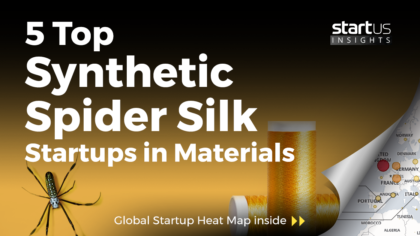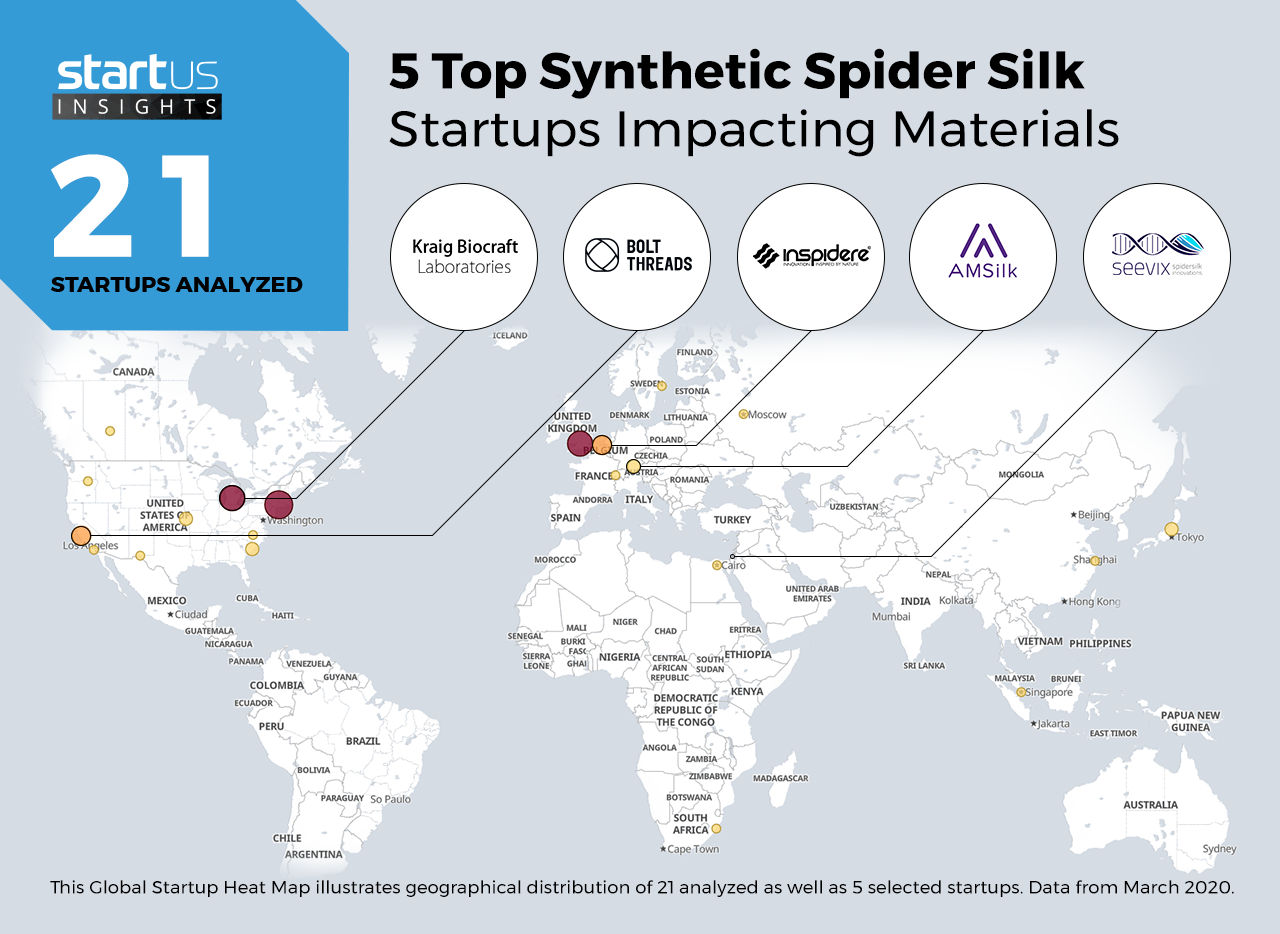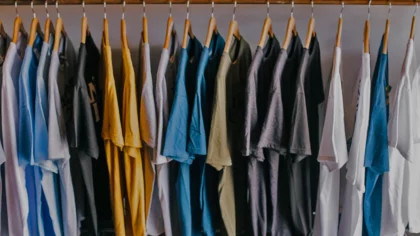Our Innovation Analysts recently looked into emerging technologies and up-and-coming startups working on solutions for the materials sector. As there is a large number of startups working on a wide variety of solutions, we want to share our insights with you. This time, we are taking a look at 5 promising synthetic spider silk startups.
Heat Map: 5 Top Synthetic Spider Silk Startups
For our 5 top picks, we used a data-driven startup scouting approach to identify the most relevant solutions globally. The Global Startup Heat Map below highlights 5 interesting examples out of 21 relevant solutions. Depending on your specific needs, your top picks might look entirely different.
Kraig Biocraft Laboratories – Polymers
Polymers find applications in many industries as they essentially combine the characteristics of different molecules to create a stronger chained network. Stronger products and economical large-scale production remain the two main goals of the manufacturing process of polymers. The natural method of producing spider silk is a time-consuming, laborious process, and has a relatively low yield. Today’s biotechnology companies synthesize spider silk and its polymers to enable the next generation of biomaterials.
US-based Kraig Biocraft Laboratories is a biotechnology research and development company involved in manufacturing advanced materials. The company develops multiple types of polymers that incorporate its patented spider silk protein sequences. The solution reduces the overall cost of production to a level that allows for the mass adoption of the technology.
Bolt Threads – Textile
Today’s textile industry has changed due to consumer concerns for the ethical production of clothing and its impact on the environment. Apparel brands also face extensive competition inside the industry to produce innovative products and attract buyers. These factors have resulted in startups & emerging companies that develop spider-silk materials for the clothing industry which go beyond the functionality of traditional materials.
US-based company Bolt Threads manufactures spider silk fibers without spiders. The production process replicates the technique used by spiders to produce the webbing while the artificial spider silk mimics the high strength, flexibility, and durability of the naturally produced version.
Inspidere – Leather Alternative
A report by Grand View Research estimates the automotive interior leather market to be USD 28 billion. Leather upholstery in a vehicle is not just a part of the aesthetics but is carefully designed and engineered to maximize comfort and comply with quality standards and inspections. Consumer concerns about sustainability and ethical procurement of leather encourage manufacturers to use alternative sources, such as spider silk.
Inspidere is a Dutch startup that produces synthetic spider silk composite materials for multiple industrial applications. For example, the startup develops composite materials to substitute leather in automotive vehicles. Inspidere’s product is impact resistant, flexible, and lightweight.
AMSilk – Cosmetics
The contents of cosmetic products usually include a variety of organic and inorganic compounds. Recently, trends in the cosmetics industry have been shifting towards certified organic products due to public opinion on their safety. As a result, companies now integrate more natural and organic materials, such as silk, in their products, rather than using artificial or chemical components.
German company AMSilk specializes in producing high-quality synthetic silk biopolymers for multiple applications. As cosmetic products usually use hydrolyzed protein, which is further reduced to pieces when added to a product, nearly all the natural effects of protein are likely to be lost. Contrary to that, AMSilk’s formulation of biopolymer silk protein retains all its functional effects and results in better cosmetic products.
Seevix – Medical Biomaterial
Medical researchers use spider silk as a functional biomaterial due to its high strength, which is similar to modern Kevlar, along with its flexibility. Early stages of synthetic spider silk development required complex spinning machines and microfluidic systems. However, replicating the natural properties of actual spider silk is now possible with the improvements in the synthesizing processes. This allows medical practitioners to integrate the material for cancer treatments and healing injuries.
Israeli startup Seevix manufactures artificial spider silk that possesses the self-healing capabilities of its natural counterpart. By integrating this spider silk in composite biomaterials, Seevix intends to develop better surgical wiring for operations, wounds, and injuries that result in reduced scarring in the long term.
What About The Other 16 Solutions?
While we believe data is key to creating insights it can be easy to be overwhelmed by it. Our ambition is to create a comprehensive overview and provide actionable innovation intelligence for your Proof of Concept (PoC), partnership, or investment targets. The 5 synthetic spider silk startups showcased above are promising examples out of 21 we analyzed for this article. To identify the most relevant solutions based on your specific criteria and collaboration strategy, get in touch.









